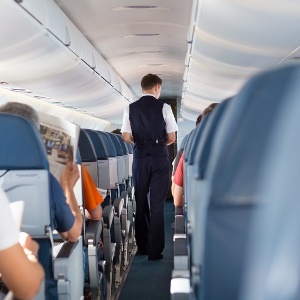
When a four-year-old girl went into anaphylactic shock during a flight because a fellow passenger four rows from her had opened a packet of nuts, the danger of nuts on board airplanes was thrust into limelight. But how does this happen? Can dust particles from a packet of nuts really affect someone not even sitting close to you?
According to Dr Sarah Karabus, a Cape Town paediatrician and allergologist practicing at Thriving Kids, Christiaan Barnard Memorial Hospital, this is a very real and worrying situation.
Carry an epinephrine injection
“Ideally, nuts should be banned on all flights, but of course this will take years to put into place. In the interim airlines should have strict policies – if a person identifies themselves to the airline staff as having a life threatening allergy, the airline should have a protocol in place on how to keep that passenger safe.
“Also, it should be mandatory for all aeroplanes to have an adrenaline auto injector such as an epipen in their first aid kit in case of a serious allergic reaction on board,” she says.
To be safe, it is recommended that you carry an epinephrine injection (Epi-pen is a commonly-used brand in South Africa) with you at all times if you suffer from severe allergies. Be sure that your family, friends and co-workers know how to administer the injection in an emergency situation.
It is also important to store your Epi-Pen correctly to ensure that it works optimally should you need it. Always keep your pen in a cool, dry place where it is protected from direct sunlight. Do not refrigerate your Epi-Pen and discard it if the solution turns cloudy or brown.
Read: Peanut allergies on the rise
How common are nut allergies?
An allergy to nuts is a serious and life-long allergy that affects both children and adults. Even a minor exposure to nuts can cause a life threatening reaction.
Anaphylactic shock is triggered when the person is exposed to an allergen, in this case peanut or tree nuts. In a confined and air-conditioned space such as an aircraft it is entirely possible that dust particles from the nuts could pass throughout the cabin and trigger a reaction from someone with an allergy.
Dr Karabus says the signs to watch for in someone with a nut allergy include an itchy throat or tongue / eyes/ears, sneezing, a runny nose, a cough, hives or a "sense of impending doom" – and this is just the early stages of the reaction.
“If left untreated it can result in severe vomiting and abdominal pain, wheezing, low blood pressure, and eventually anaphylaxis shock or collapse.”
Dr Karabus adds that the most important treatment is adrenaline. “Even if you aren't sure it is indeed anaphylaxis , rather give the adrenaline anyway. It isn't harmful harm to administer it in a situation where it isn't needed, but if it is give too late when there is anaphylaxis, it could be fatal.”
Read: Life-threatening allergy attacks
How nut-savvy are SA airlines?
While many overseas airlines are taking steps to minimise any chance of one of their passengers with a nut allergy being exposed to nuts or nut-dust, it appears South Africa is not keeping up with this trend.
According to the South African Airways website, they are “ unable to provide a completely nut free flight” and state that they “cannot stop other passengers from bringing food on board that may contain traces of nuts and the particles may get into the air conditioning system”.
They also admit that the catering company they use may also be exposed to nuts so they cannot guarantee their meals would not be contaminated with nuts.
They do advise strongly that any passenger with a nut allergy “must be treated as a medical case and booked as such” and carry with them a doctor’s note detailing the severity of the allergy, their risk for an allergic reaction if exposed to nut dust on board, which medications they would take in such a case and in extreme cases, a dose of their medication.
Virgin Atlantic shares this standpoint and state on their website that while peanuts are not included in their meals, they also cannot guarantee their meals have not come into contact with nuts during production. They also state that they cannot stop other passengers from taking their own food – which may be nuts – on board but claim they will make an announcement on board that there is someone with a nut allergy on board and ask people to refrain from eating anything with nuts in it.
If you suffer from nut allergy and plan to travel via aeroplane, Anaphylaxis Campaign, a UK-based charity has a comprehensive list of different airlines and their respective policies regarding allergies. Be sure to check this list before booking your flights.
Read more:
Use epinephrine quickly for severe allergic reactions
Nuts and food manufacturing safety




 Publications
Publications
 Partners
Partners











